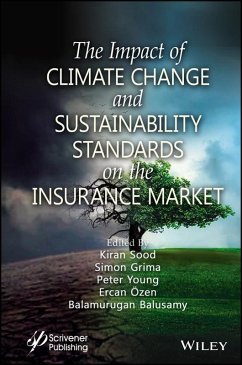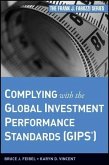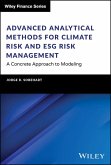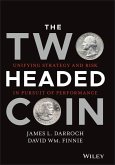The Impact of Climate Change and Sustainability Standards on the Insurance Market (eBook, PDF)
Redaktion: Sood, Kiran; Balusamy, Balamurugan; Ozen, Ercan; Young, Peter C.; Grima, Simon


Alle Infos zum eBook verschenken

The Impact of Climate Change and Sustainability Standards on the Insurance Market (eBook, PDF)
Redaktion: Sood, Kiran; Balusamy, Balamurugan; Ozen, Ercan; Young, Peter C.; Grima, Simon
- Format: PDF
- Merkliste
- Auf die Merkliste
- Bewerten Bewerten
- Teilen
- Produkt teilen
- Produkterinnerung
- Produkterinnerung

Hier können Sie sich einloggen

Bitte loggen Sie sich zunächst in Ihr Kundenkonto ein oder registrieren Sie sich bei bücher.de, um das eBook-Abo tolino select nutzen zu können.
The Impact of CLIMATE CHANGE and SUSTAINABILITY STANDARDS on the INSURANCE MARKET The book explores the role of the insurance industry in contributing and responding to the harms that climate change has brought. This book delves into the physical and logical impacts, both direct and indirect, on the insurance industry. Subjects discussed include new technology such as big data, artificial intelligence, machine learning, the growth of sustainable economics with foreign direct investments (FDIs), trustworthiness, and ethics. Related use cases of data science for claim processing, fraud detection…mehr
- Geräte: PC
- mit Kopierschutz
- eBook Hilfe
- Größe: 43.36MB
![The Failure of Risk Management (eBook, PDF) The Failure of Risk Management (eBook, PDF)]() Douglas W. HubbardThe Failure of Risk Management (eBook, PDF)33,99 €
Douglas W. HubbardThe Failure of Risk Management (eBook, PDF)33,99 €![Big Data for Insurance Companies (eBook, PDF) Big Data for Insurance Companies (eBook, PDF)]() Big Data for Insurance Companies (eBook, PDF)139,99 €
Big Data for Insurance Companies (eBook, PDF)139,99 €![Complying with the Global Investment Performance Standards (GIPS) (eBook, PDF) Complying with the Global Investment Performance Standards (GIPS) (eBook, PDF)]() Bruce J. FeibelComplying with the Global Investment Performance Standards (GIPS) (eBook, PDF)57,99 €
Bruce J. FeibelComplying with the Global Investment Performance Standards (GIPS) (eBook, PDF)57,99 €![Advanced Analytical Methods for Climate Risk and ESG Risk Management (eBook, PDF) Advanced Analytical Methods for Climate Risk and ESG Risk Management (eBook, PDF)]() Jorge R. SobehartAdvanced Analytical Methods for Climate Risk and ESG Risk Management (eBook, PDF)78,99 €
Jorge R. SobehartAdvanced Analytical Methods for Climate Risk and ESG Risk Management (eBook, PDF)78,99 €![The Principles of Banking (eBook, PDF) The Principles of Banking (eBook, PDF)]() Moorad ChoudhryThe Principles of Banking (eBook, PDF)59,99 €
Moorad ChoudhryThe Principles of Banking (eBook, PDF)59,99 €![The Two Headed Coin (eBook, PDF) The Two Headed Coin (eBook, PDF)]() James L. DarrochThe Two Headed Coin (eBook, PDF)25,99 €
James L. DarrochThe Two Headed Coin (eBook, PDF)25,99 €![The Principles of Banking (eBook, PDF) The Principles of Banking (eBook, PDF)]() Moorad ChoudhryThe Principles of Banking (eBook, PDF)60,99 €
Moorad ChoudhryThe Principles of Banking (eBook, PDF)60,99 €-
-
-
Dieser Download kann aus rechtlichen Gründen nur mit Rechnungsadresse in A, B, BG, CY, CZ, D, DK, EW, E, FIN, F, GR, HR, H, IRL, I, LT, L, LR, M, NL, PL, P, R, S, SLO, SK ausgeliefert werden.
- Produktdetails
- Verlag: Wiley
- Seitenzahl: 496
- Erscheinungstermin: 4. Juli 2023
- Englisch
- ISBN-13: 9781394167937
- Artikelnr.: 68435564
- Verlag: Wiley
- Seitenzahl: 496
- Erscheinungstermin: 4. Juli 2023
- Englisch
- ISBN-13: 9781394167937
- Artikelnr.: 68435564
- Herstellerkennzeichnung Die Herstellerinformationen sind derzeit nicht verfügbar.
Preface xxiii
Part I: The Impact of Digitalisation and Lines of Insurance on Sustainable
Development 1
1 Sustainability Through Digital Insurance 3
Satinder Singh, Jashandeep Singh and Shilpi Gupta
1.1 Introduction 4
1.2 Theoretical Background 6
1.2.1 Origin and Concept of Digital Insurance 6
1.2.2 The Internet of Things 6
1.2.3 Digital Ecosystem for Insurers 8
1.2.4 Digital Disruption in the Insurance Industry 9
1.3 Sustainability and Digital Insurance 10
1.3.1 Principles for Sustainable Insurance 12
1.4 Digital Insurance and Sustainable Goals 12
1.5 Findings 14
1.6 Conclusion 15
1.7 Implications 15
References 16
2 Motor Vehicle Insurance Industry in India: A Review 23
Uma Shankar Yadav, Nikhil Yadav, Ravindra Tripathi and Kiran Sood
2.1 Introduction 24
2.1.1 Why Do We Need Motor Vehicle Insurance? 24
2.1.2 Need and Significance of the Study 25
2.2 The Rationale for the Study of VMI in India 26
2.2.1 Importance of Insurance in Our Daily Life 27
2.2.2 VMI Industry and Effect of Pandemic (COVID-19) 27
2.2.3 Motor Vehicle Insurance in India 28
2.2.4 New Insurance Policy Rule in India 29
2.3 Literature Review 29
2.4 Objective 30
2.5 Methodology 30
2.6 Discussion 31
2.6.1 Motor Insurance Sales in India 31
2.7 Findings 34
2.7.1 MVA Act 2019 35
2.7.2 Benefits of VMI 36
2.8 Result 36
2.9 Conclusion 37
References 38
3 Demystifying the Prospects for Insurance Companies to Finance the Energy
Metamorphosis: A Study on Indian Insurance and Sustainable Development 41
Mukul Bhatnagar, Letife Özdemir and Nitin Pathak
3.1 Introduction 42
3.2 Present Status of India in Energy Transition 43
3.3 The Prospects for Insurance Enterprises to Finance the Energy
Metamorphosis 44
3.4 The Reasons Why India's Renewable Energy Investments are Anticipated to
Expand 46
3.5 Harnessing Insurance for Sustainable Development 48
3.6 Conclusion 49
References 50
4 Artificial Intelligence in the Health Insurance Sector: Sustainable or
Unsustainable from the Lens of Ethical-Legal and Socio-Economic Standards
57
Yogesh Mishra and Ankita Shaw
4.1 Introduction 58
4.2 Conceptualizing Sustainable Health Insurance 60
4.3 Integration of Artificial Intelligence in Health Insurance: A
Background 60
4.4 Integration of AI in Health Insurance: A Bird's Eye View from Ethical
Implications Perspective 62
4.4.1 Issue of Transparency 62
4.4.2 Issue of Accountability 63
4.4.3 Issue of Algorithmic Bias 63
4.4.4 Issue of Informed Consent 63
4.4.5 Issue of Safety and the Use of AI in the Insurance Sector 64
4.4.6 Issue of Trust Deficit Between the Insurance Providers and the
Insured 64
4.4.7 The Issue of Explainability 65
4.5 Integration of AI in Health Insurance: Evaluation of Socio-Economic
Repercussions 65
4.5.1 Economic Growth vis-à-vis Sustainability: Does Implementation of AI
in Health Insurance Pose Unsustainability? 66
4.5.2 AI in Health Insurance: Issue of Equitability 67
4.6 Integration of AI in Health Insurance: Requirement of Ideal Model Legal
Standards for India 68
4.7 Recommendations 70
4.8 Concluding Remarks 71
References 72
5 Medical Crowdfunding: From the Lens of Health Insurance 75
Shivani Inder and Rishu Bhardwaj
5.1 Introduction 75
5.2 Crowdfunding in Healthcare: Medical Crowdfunding 76
5.3 Medical Crowdfunding: Compliment to Health Insurance 78
5.4 Medical Crowdfunding: Concerns and Consequences 80
5.5 Concluding Remarks 82
References 82
6 Digital Transformation of the Insurance Industry - A Case of the Indian
Insurance Sector 85
Pawan Kumar, Sanjay Taneja, Mukul and Ercan Özen
6.1 Introduction 86
6.2 Literature Review 90
6.3 Conclusion 100
References 101
Part II: The Impact of Climate Change on Insurance Markets 107
7 Climate Resilient Agriculture: Binding Agriculture Innovations and
Insurance 109
Kirandeep Kaur, Jasmandeep Kaur and Ramanjeet Singh
7.1 Introduction 110
7.2 Agricultural Innovation and Trends 111
7.3 Agricultural Innovation for Agricultural Productivity 114
7.4 Agricultural Insurance and Trends 115
7.5 Agricultural Insurance and Poverty Eradication 116
7.6 Innovations within Agricultural Insurance 118
7.7 Challenges and Difficulties Associated with Agricultural Innovation 120
7.8 Barriers to Agricultural Insurance Adoption 121
7.9 Future Projection of Agricultural Innovation and Insurance 121
7.10 Conclusion 122
References 124
8 Climate Change Resilience Support in the Insurance Sector 127
Reena Malik, Jyoti Verma and Ambuj Sharma
8.1 Introduction 127
8.2 Catastrophe Insurance and Climate Change 128
8.3 Carney Defines Climate Risks 129
8.4 Heading Towards Reducing Carbon Footprints 130
8.5 Climate Change Adaptation and Mitigation: Paradigm Shift 131
8.6 Building Resilience 132
8.7 Critical Infrastructure Decarbonation and Climate Resilience Emphasis
133
8.8 Combating Challenges 135
8.9 Role of Stakeholders 136
8.10 Role of Government 136
8.11 Recommendations at Company Level 138
8.12 Recommendations at Industry Level 138
8.13 Mitigating Losses with Technology 139
8.13.1 Satellite Imagery 139
8.13.2 Location-Risk Intelligence 139
8.13.3 Adjusting Claim with AR/VR 139
8.13.4 Biometrics 140
8.14 Conclusion 140
References 140
9 Sustainable Climate Change and its Impact on the Insurance Sector 143
Amrinder Singh and Geetika Madaan
9.1 Introduction 144
9.2 Science and Politics of Climate Change 144
9.3 The Implications of Climate Change for the Insurance Sector 146
9.4 The Insurance Sector's Present Attitudes Towards Climate Change 148
9.5 Motivations for Thinking Differently About Climate Change 149
9.5.1 Lack of Ideal Information 150
9.5.2 Lack of Long-Term Business Planning 150
9.5.3 Social Pressure from Peers 151
9.5.4 Aspects of the Institutional Structure 151
9.6 Avoiding Risks from Natural Disasters 152
9.7 The Insurance Industry's Approach to Environmental Policy 153
9.8 Variation on a Global Scale 154
9.9 The Role of Government in Preventing Natural Disasters 155
9.10 Natural Disaster Cooperation Framework 156
9.11 Added Prospects for Insurers 158
9.11.1 Unparalleled Understanding of Potential Dangers 158
9.11.2 New Insurance Markets 159
9.11.3 Diversification 159
9.12 Concluding Remarks 160
References 161
10 A Study Regarding the Effectiveness of Environmental Education on
Climate Change 165
Manju Dahiya and Naman Mishra
10.1 Introduction 166
10.2 Literature Review 167
10.3 Theoretical Concerns 168
10.4 Research Objectives 169
10.4.1 Data Analysis 169
10.5 Inference 175
10.6 Conclusion 176
References 176
11 Contribution of the Insurance Sector in Sustaining the Climate: An
Analytical Study 179
Arti Gaur and Sweta Bhatti
11.1 Introduction 180
11.2 Sustainable Insurance 181
11.3 Principles for Sustainable Insurance 182
11.4 Role of Insurance Sector in Climate Change 182
11.5 Sustainability Highlights and Initiatives Taken for Climate by SBI
Life 184
11.6 Energy Conservation Initiatives 184
11.7 Reduction of Carbon Footprints Plays a Vital Role in Sustaining the
Climate 186
11.8 Enhancing Sustainability Through Insurance 187
11.9 Conclusion 190
References 190
12 Impact of Climate Change on Agriculture 193
Arti Gaur and Sanju Verma
Abbreviations 194
12.1 Introduction 194
12.2 Agricultural Insurance - Risk Management 196
12.3 Various Agriculture Insurance Programs 197
12.3.1 Pradhan Mantri Fasal Bima Yojana 197
12.3.2 Weather-Based Crop Insurance Plan 199
12.3.3 Coconut Palm Insurance Scheme (CPIS) 200
12.3.4 Unified Package Insurance Scheme (UPIS) 200
12.4 Crop Insurance 201
12.5 Impact of Climate Change on Agriculture 204
12.6 NICRA Assisted Farmers to Cope with Climate Variation 207
12.7 Conclusion 207
References 209
13 Climate Change: Not Only a Projection for Emerging Risks But a Reality
for the Insurance Sector 211
Jyoti Verma, Reena Malik and Rachit Agarwal
13.1 Introduction 212
13.2 Impact of Climate Change on Global Insurance Industry 213
13.3 International Practice of Insurance Mechanism in Combating the Risk of
Climate Change 215
13.4 Conclusion 217
References 217
14 A Systematic Review of ESG Investing and Climate Change as a Sustainable
Practice in the Insurance Industry 221
Cheenu Goel, Payal Bassi and Pankaj
14.1 Introduction 222
14.2 Review of Literature 223
14.3 Research Methodology 224
14.4 Data and Network Analysis 225
14.4.1 Year-Wise Publication Details 225
14.4.2 Top 10 Journals 225
14.4.3 Network Association of Co-Authorship with Countries 227
14.4.4 Network Association of Co-Authorship with Authors 227
14.4.5 Co-Occurrence of All Keywords 228
14.4.6 Co-Occurrence of Index Keywords 229
14.4.7 Citation Analysis - Citation of Source 230
14.4.8 Author Analysis - Citation with Authors 231
14.4.9 Bibliographic Coupling of Documents 231
14.4.10 Bibliographic Coupling of Countries 232
14.5 Conclusion 233
References 234
15 SLR on Aspects of Climatic Change in the Agriculture Industry in the
Context of Weather Index Insurance: Visualization Through Network Diagrams
237
Payal Bassi, Cheenu Goel and Pankaj
15.1 Introduction 238
15.2 Review of Literature 238
15.3 Research Methodology 240
15.4 Data and Network Analysis 241
15.4.1 Publications by Year 241
15.4.2 Publications by Document Type 241
15.4.3 Influential Journals 242
15.4.3.1 Top 10 Journals Based on Count 242
15.4.3.2 Alluvial Diagram Showing the Top 10
Journals Along with their Country of Origin and Impact Factor 243
15.4.4 Alluvial Visualization of Top 10 Authors Based on Citations 244
15.4.5 Alluvial Representation of Rank Score of Publications by Top 10
Authors 245
15.4.6 Network Analysis of Co-Occurrence of All Keywords 246
15.4.7 Network Analysis of Co-Citation of Cited Sources 246
15.4.8 Co-Citation with Cited Authors 247
15.5 Conclusion 248
References 249
16 Impact of Climate-Disruptive Industries on the Global Insurance and Risk
Management Scenario 253
Kirandeep Kaur, Kiran Sood and Simon Grima
16.1 Introduction 254
16.1.1 Genetic and Extractive Sector 255
16.1.1.1 The Parallel Impact on Insurance Mechanism 255
16.1.1.2 The Implications in Relevance to Rising Costs and
Insurance-Related Risks 256
16.1.2 Transportation Sector 256
16.1.2.1 Accountability to Climate Change and Risk Expansion 256
16.1.2.2 Exhaustive Activities Posing a Threat to the Risk-Bearing
Potential of Insurance Sector 258
16.1.3 Construction Sector 258
16.1.3.1 A Challenge to the Resilience of the Property/Casualty Industry
258
16.1.3.2 A Growing Demand for the Sector Pressurizing the Existing
Insurance Model 260
16.2 Objective of the Study 260
16.3 Review of Literature 260
16.4 Research Gap 262
16.5 Findings 263
16.6 Discussions and Conclusion 264
References 265
17 Examining the Antecedents and Consequences of Corporate Commitment
Towards Climate Change 269
Rajni Bala and Sandeep Singh
17.1 Introduction to Climate Change 270
17.2 Literature Review 271
17.3 Antecedents of Climate Change 273
17.4 Consequences of Climate Change 273
17.5 Conclusion 274
References 275
18 Climate Change and the Insurance Sector: An Analysis of Sustainable
Development in India 279
Balpreet Singh
18.1 Introduction 279
18.2 Purpose 282
18.3 Methodology 282
18.4 Findings and Discussion 283
18.5 Opportunities for Sustainable Insurance 284
18.6 Conclusion 285
References 286
Part III: The Impact of Behaviour, Culture, Education and Internal Controls
287
19 The Role of Internal Audit in Risk Management with a Perspective of
Sustainability Development 289
Vinita Choudhary and Sonal Trivedi
19.1 Introduction 290
19.1.1 Role of Internal Audit in Risk Management 290
19.1.2 Purpose and Significance of the Study 291
19.1.3 Problem Statement and Research Gap 291
19.1.4 Structure of the Study 292
19.2 Literature Review 292
19.2.1 Internal Audit 292
19.2.1.1 Definition and Meaning of Internal Audit 293
19.2.1.2 The Role of Internal Audit in Any Organization 294
19.2.1.3 The Duties and Responsibilities of an Internal Auditor 295
19.2.2 Risk Management 296
19.2.2.1 Definition of Risk Management 296
19.2.2.2 Benefits of Risk Management 296
19.2.2.3 Types of Risk in Insurance Industry 297
19.2.2.4 Risk Insurance Concept 299
19.2.3 Relationship Between Internal Audit and Risk Management 299
19.2.4 The Insurance Industry in the Context of Climate Change 304
19.3 Case Discussion 307
19.3.1 Case - Internal Audit and Risk Management of General Insurance
Companies in India 307
19.3.2 Discussion Question in Given Case 309
19.4 Contribution of Study 309
19.5 Conclusion 309
References 310
Website 315
20 Environment Education and Insurance Awareness - A Boon to Indian
Insurance Sector 317
Sanjeev Kumar, Kunal Raheja and Ankit Dhiraj
20.1 Introduction 318
20.1.1 Effect of Climate Change on India 318
20.1.2 Costs to India's Economy from Climate Change 321
20.2 The History of India's Insurance Sector 323
20.2.1 Things that Changed in the History of the Indian Insurance Business
were Big the Indian Insurance Scene has Slowly Changed in the Following
Ways 324
20.3 Insurance Plays a Vital Role 325
20.4 School and University Teaching Environment Awareness 328
20.4.1 Best Practices Adopted by School and University 328
20.5 Different Benefits of Environment Education in Society 328
20.5.1 Imagination 328
20.5.2 Classroom Learning 329
20.5.3 Creative Thinking Skills 329
20.5.4 Learning Standards 329
20.5.5 Healthy Lifestyle 329
20.5.6 Communities 329
20.6 Teacher and Students Empowered 329
20.7 Conclusion 330
References 330
21 Cultivating Sustainable Behavior and Critical Consciousness Towards the
Environment: Environmental Education for Sustainability 333
Seema Yadav
21.1 Introduction 334
21.2 Environmental Education as Concept: Promoting Sustainability 334
21.3 Environmental Education as an Approach for Addressing Environmental
Problems 337
21.4 Dealing with Complexities: Changing the Scenario with Environmental
Education 338
21.5 Making Students Environmental Conscious with Environmental Education
340
21.6 Teachers' Role in Achieving the Goals of Environmental Education 341
21.7 What is Next? It is: Being Innovative in Environmental Education 342
21.8 Conclusion 345
References 346
22 Adoption of ESG by the Insurance Industry: Conceptual Framework and
Future Recommendations 349
Kumar Shalender, Babita Singla and Sandhir Sharma
22.1 Introduction 349
22.2 Principles of ESG Integration in Insurance Sector 351
22.3 ESG Implementation Framework 355
22.4 Conclusion and Discussion 356
References 357
23 Sustainable Solutions for Insurance and Risk Management 359
Harret Kaur, Kiran Sood, Uma Shankar Yadav and Simon Grima
23.1 Introduction 360
23.1.1 Objectives 361
23.2 Literature Review 361
23.2.1 Research Gap 363
23.3 Research Methodology 363
23.4 Discussion 364
23.4.1 Functions of Insurance in Sustainable Development and Transfer of
Risk 364
23.4.2 The Contribution of the Insurance Sector Towards Sustainable
Development 365
23.5 Result and Conclusion 366
23.5.1 Recommendations and Future Scope 366
23.6 Challenges and Limitations 368
23.6.1 Various Challenges Posed Due to the Adoption of Sustainable
Insurance 368
23.6.2 The Limitations of the Paper 368
References 369
24 Target 8.8: Protect Labor Rights and Promote a Safe Working Environment
373
Nikita Singla, Kiran Sood, Simon Grima and Uma Shankar Yadav
24.1 Introduction 374
24.2 Review of Literature 378
24.3 Research Methodology 384
24.4 Target 8.8 385
24.5 Conclusion 390
References 390
25 A Study on Challenges to Sustainable Development 393
Baljinder Kaur and Harreet Kaur
25.1 Introduction 393
25.2 Aim of the Research 394
25.3 Methodology 394
25.4 Discussion 395
25.5 Factors Influencing Sustainable Development 397
25.6 Challenges in Achieving SDGs 397
25.7 Conclusion 398
25.8 Suggestions 399
References 400
26 E-waste Management: A Transition Towards a Circular Economy 403
Baljinder Kaur, Kirandeep Kaur and Harreet Kaur
26.1 Introduction 403
26.2 Worldwide E-waste Structure 406
26.3 Strategic Approaches 411
26.4 DEMATEL Method 412
26.5 Assessment of Life Cycle 412
26.6 Challenges Related to E-waste Recycling 413
26.7 Conclusion 413
References 414
27 Environmental, Social, and Governance (ESG) Measures and Their Impact on
Insurance Industry: A Global Perspective 417
Amrik Singh and Gaurav Bathla
27.1 Introduction 417
27.2 Literature Review 419
27.3 Trends Shaping ESG in the Insurance Sector 421
27.3.1 Strong Governance and Employee Engagement 421
27.3.2 Advances in Technology 422
27.3.3 More Accountability and Transparency 422
27.3.4 Macroeconomic 423
27.4 ESG Challenges in the Insurance Sector 423
27.4.1 Environmental Challenge 424
27.4.2 Social Challenge 424
27.4.3 Governance Challenge 425
27.5 Conclusion 425
References 426
28 Environmental Risk and Sustaining the Insurance Industry 429
Gurpreet Kaur
28.1 Introduction 430
28.2 Review of Literature 431
28.3 Literature Analysis 432
28.3.1 Findings 432
28.4 Conclusion 435
References 436
29 Global Energy Crisis: Impact on the Global Economy 439
Peterson K. Ozili and Ercan Ozen
29.1 Introduction 439
29.2 Review of Related Studies 442
29.3 Understanding the 2021-2022 Global Energy Crisis 442
29.3.1 Energy Crisis in Europe 443
29.3.2 Energy Crisis in Asia 444
29.3.3 Energy Crisis in Africa 444
29.3.4 Energy Crisis in the Middle East 444
29.3.5 The Contribution of Russian-Ukraine Conflict to the Energy Crisis
445
29.4 Methodology 445
29.5 Empirical Results 445
29.5.1 Gasoline Price: Some Data from Around the World 445
29.5.1.1 Gasoline Price in Africa 445
29.5.1.2 Gasoline Price in Europe 446
29.5.1.3 Gasoline Price in Asia 446
29.5.1.4 Gasoline Price in Middle East Countries 448
29.5.1.5 Gasoline Price in the Region of the Americas 449
29.5.2 Regional Correlation 449
29.5.3 Granger Causality Test 452
29.6 Conclusion 452
References 453
Index 455
Preface xxiii
Part I: The Impact of Digitalisation and Lines of Insurance on Sustainable
Development 1
1 Sustainability Through Digital Insurance 3
Satinder Singh, Jashandeep Singh and Shilpi Gupta
1.1 Introduction 4
1.2 Theoretical Background 6
1.2.1 Origin and Concept of Digital Insurance 6
1.2.2 The Internet of Things 6
1.2.3 Digital Ecosystem for Insurers 8
1.2.4 Digital Disruption in the Insurance Industry 9
1.3 Sustainability and Digital Insurance 10
1.3.1 Principles for Sustainable Insurance 12
1.4 Digital Insurance and Sustainable Goals 12
1.5 Findings 14
1.6 Conclusion 15
1.7 Implications 15
References 16
2 Motor Vehicle Insurance Industry in India: A Review 23
Uma Shankar Yadav, Nikhil Yadav, Ravindra Tripathi and Kiran Sood
2.1 Introduction 24
2.1.1 Why Do We Need Motor Vehicle Insurance? 24
2.1.2 Need and Significance of the Study 25
2.2 The Rationale for the Study of VMI in India 26
2.2.1 Importance of Insurance in Our Daily Life 27
2.2.2 VMI Industry and Effect of Pandemic (COVID-19) 27
2.2.3 Motor Vehicle Insurance in India 28
2.2.4 New Insurance Policy Rule in India 29
2.3 Literature Review 29
2.4 Objective 30
2.5 Methodology 30
2.6 Discussion 31
2.6.1 Motor Insurance Sales in India 31
2.7 Findings 34
2.7.1 MVA Act 2019 35
2.7.2 Benefits of VMI 36
2.8 Result 36
2.9 Conclusion 37
References 38
3 Demystifying the Prospects for Insurance Companies to Finance the Energy
Metamorphosis: A Study on Indian Insurance and Sustainable Development 41
Mukul Bhatnagar, Letife Özdemir and Nitin Pathak
3.1 Introduction 42
3.2 Present Status of India in Energy Transition 43
3.3 The Prospects for Insurance Enterprises to Finance the Energy
Metamorphosis 44
3.4 The Reasons Why India's Renewable Energy Investments are Anticipated to
Expand 46
3.5 Harnessing Insurance for Sustainable Development 48
3.6 Conclusion 49
References 50
4 Artificial Intelligence in the Health Insurance Sector: Sustainable or
Unsustainable from the Lens of Ethical-Legal and Socio-Economic Standards
57
Yogesh Mishra and Ankita Shaw
4.1 Introduction 58
4.2 Conceptualizing Sustainable Health Insurance 60
4.3 Integration of Artificial Intelligence in Health Insurance: A
Background 60
4.4 Integration of AI in Health Insurance: A Bird's Eye View from Ethical
Implications Perspective 62
4.4.1 Issue of Transparency 62
4.4.2 Issue of Accountability 63
4.4.3 Issue of Algorithmic Bias 63
4.4.4 Issue of Informed Consent 63
4.4.5 Issue of Safety and the Use of AI in the Insurance Sector 64
4.4.6 Issue of Trust Deficit Between the Insurance Providers and the
Insured 64
4.4.7 The Issue of Explainability 65
4.5 Integration of AI in Health Insurance: Evaluation of Socio-Economic
Repercussions 65
4.5.1 Economic Growth vis-à-vis Sustainability: Does Implementation of AI
in Health Insurance Pose Unsustainability? 66
4.5.2 AI in Health Insurance: Issue of Equitability 67
4.6 Integration of AI in Health Insurance: Requirement of Ideal Model Legal
Standards for India 68
4.7 Recommendations 70
4.8 Concluding Remarks 71
References 72
5 Medical Crowdfunding: From the Lens of Health Insurance 75
Shivani Inder and Rishu Bhardwaj
5.1 Introduction 75
5.2 Crowdfunding in Healthcare: Medical Crowdfunding 76
5.3 Medical Crowdfunding: Compliment to Health Insurance 78
5.4 Medical Crowdfunding: Concerns and Consequences 80
5.5 Concluding Remarks 82
References 82
6 Digital Transformation of the Insurance Industry - A Case of the Indian
Insurance Sector 85
Pawan Kumar, Sanjay Taneja, Mukul and Ercan Özen
6.1 Introduction 86
6.2 Literature Review 90
6.3 Conclusion 100
References 101
Part II: The Impact of Climate Change on Insurance Markets 107
7 Climate Resilient Agriculture: Binding Agriculture Innovations and
Insurance 109
Kirandeep Kaur, Jasmandeep Kaur and Ramanjeet Singh
7.1 Introduction 110
7.2 Agricultural Innovation and Trends 111
7.3 Agricultural Innovation for Agricultural Productivity 114
7.4 Agricultural Insurance and Trends 115
7.5 Agricultural Insurance and Poverty Eradication 116
7.6 Innovations within Agricultural Insurance 118
7.7 Challenges and Difficulties Associated with Agricultural Innovation 120
7.8 Barriers to Agricultural Insurance Adoption 121
7.9 Future Projection of Agricultural Innovation and Insurance 121
7.10 Conclusion 122
References 124
8 Climate Change Resilience Support in the Insurance Sector 127
Reena Malik, Jyoti Verma and Ambuj Sharma
8.1 Introduction 127
8.2 Catastrophe Insurance and Climate Change 128
8.3 Carney Defines Climate Risks 129
8.4 Heading Towards Reducing Carbon Footprints 130
8.5 Climate Change Adaptation and Mitigation: Paradigm Shift 131
8.6 Building Resilience 132
8.7 Critical Infrastructure Decarbonation and Climate Resilience Emphasis
133
8.8 Combating Challenges 135
8.9 Role of Stakeholders 136
8.10 Role of Government 136
8.11 Recommendations at Company Level 138
8.12 Recommendations at Industry Level 138
8.13 Mitigating Losses with Technology 139
8.13.1 Satellite Imagery 139
8.13.2 Location-Risk Intelligence 139
8.13.3 Adjusting Claim with AR/VR 139
8.13.4 Biometrics 140
8.14 Conclusion 140
References 140
9 Sustainable Climate Change and its Impact on the Insurance Sector 143
Amrinder Singh and Geetika Madaan
9.1 Introduction 144
9.2 Science and Politics of Climate Change 144
9.3 The Implications of Climate Change for the Insurance Sector 146
9.4 The Insurance Sector's Present Attitudes Towards Climate Change 148
9.5 Motivations for Thinking Differently About Climate Change 149
9.5.1 Lack of Ideal Information 150
9.5.2 Lack of Long-Term Business Planning 150
9.5.3 Social Pressure from Peers 151
9.5.4 Aspects of the Institutional Structure 151
9.6 Avoiding Risks from Natural Disasters 152
9.7 The Insurance Industry's Approach to Environmental Policy 153
9.8 Variation on a Global Scale 154
9.9 The Role of Government in Preventing Natural Disasters 155
9.10 Natural Disaster Cooperation Framework 156
9.11 Added Prospects for Insurers 158
9.11.1 Unparalleled Understanding of Potential Dangers 158
9.11.2 New Insurance Markets 159
9.11.3 Diversification 159
9.12 Concluding Remarks 160
References 161
10 A Study Regarding the Effectiveness of Environmental Education on
Climate Change 165
Manju Dahiya and Naman Mishra
10.1 Introduction 166
10.2 Literature Review 167
10.3 Theoretical Concerns 168
10.4 Research Objectives 169
10.4.1 Data Analysis 169
10.5 Inference 175
10.6 Conclusion 176
References 176
11 Contribution of the Insurance Sector in Sustaining the Climate: An
Analytical Study 179
Arti Gaur and Sweta Bhatti
11.1 Introduction 180
11.2 Sustainable Insurance 181
11.3 Principles for Sustainable Insurance 182
11.4 Role of Insurance Sector in Climate Change 182
11.5 Sustainability Highlights and Initiatives Taken for Climate by SBI
Life 184
11.6 Energy Conservation Initiatives 184
11.7 Reduction of Carbon Footprints Plays a Vital Role in Sustaining the
Climate 186
11.8 Enhancing Sustainability Through Insurance 187
11.9 Conclusion 190
References 190
12 Impact of Climate Change on Agriculture 193
Arti Gaur and Sanju Verma
Abbreviations 194
12.1 Introduction 194
12.2 Agricultural Insurance - Risk Management 196
12.3 Various Agriculture Insurance Programs 197
12.3.1 Pradhan Mantri Fasal Bima Yojana 197
12.3.2 Weather-Based Crop Insurance Plan 199
12.3.3 Coconut Palm Insurance Scheme (CPIS) 200
12.3.4 Unified Package Insurance Scheme (UPIS) 200
12.4 Crop Insurance 201
12.5 Impact of Climate Change on Agriculture 204
12.6 NICRA Assisted Farmers to Cope with Climate Variation 207
12.7 Conclusion 207
References 209
13 Climate Change: Not Only a Projection for Emerging Risks But a Reality
for the Insurance Sector 211
Jyoti Verma, Reena Malik and Rachit Agarwal
13.1 Introduction 212
13.2 Impact of Climate Change on Global Insurance Industry 213
13.3 International Practice of Insurance Mechanism in Combating the Risk of
Climate Change 215
13.4 Conclusion 217
References 217
14 A Systematic Review of ESG Investing and Climate Change as a Sustainable
Practice in the Insurance Industry 221
Cheenu Goel, Payal Bassi and Pankaj
14.1 Introduction 222
14.2 Review of Literature 223
14.3 Research Methodology 224
14.4 Data and Network Analysis 225
14.4.1 Year-Wise Publication Details 225
14.4.2 Top 10 Journals 225
14.4.3 Network Association of Co-Authorship with Countries 227
14.4.4 Network Association of Co-Authorship with Authors 227
14.4.5 Co-Occurrence of All Keywords 228
14.4.6 Co-Occurrence of Index Keywords 229
14.4.7 Citation Analysis - Citation of Source 230
14.4.8 Author Analysis - Citation with Authors 231
14.4.9 Bibliographic Coupling of Documents 231
14.4.10 Bibliographic Coupling of Countries 232
14.5 Conclusion 233
References 234
15 SLR on Aspects of Climatic Change in the Agriculture Industry in the
Context of Weather Index Insurance: Visualization Through Network Diagrams
237
Payal Bassi, Cheenu Goel and Pankaj
15.1 Introduction 238
15.2 Review of Literature 238
15.3 Research Methodology 240
15.4 Data and Network Analysis 241
15.4.1 Publications by Year 241
15.4.2 Publications by Document Type 241
15.4.3 Influential Journals 242
15.4.3.1 Top 10 Journals Based on Count 242
15.4.3.2 Alluvial Diagram Showing the Top 10
Journals Along with their Country of Origin and Impact Factor 243
15.4.4 Alluvial Visualization of Top 10 Authors Based on Citations 244
15.4.5 Alluvial Representation of Rank Score of Publications by Top 10
Authors 245
15.4.6 Network Analysis of Co-Occurrence of All Keywords 246
15.4.7 Network Analysis of Co-Citation of Cited Sources 246
15.4.8 Co-Citation with Cited Authors 247
15.5 Conclusion 248
References 249
16 Impact of Climate-Disruptive Industries on the Global Insurance and Risk
Management Scenario 253
Kirandeep Kaur, Kiran Sood and Simon Grima
16.1 Introduction 254
16.1.1 Genetic and Extractive Sector 255
16.1.1.1 The Parallel Impact on Insurance Mechanism 255
16.1.1.2 The Implications in Relevance to Rising Costs and
Insurance-Related Risks 256
16.1.2 Transportation Sector 256
16.1.2.1 Accountability to Climate Change and Risk Expansion 256
16.1.2.2 Exhaustive Activities Posing a Threat to the Risk-Bearing
Potential of Insurance Sector 258
16.1.3 Construction Sector 258
16.1.3.1 A Challenge to the Resilience of the Property/Casualty Industry
258
16.1.3.2 A Growing Demand for the Sector Pressurizing the Existing
Insurance Model 260
16.2 Objective of the Study 260
16.3 Review of Literature 260
16.4 Research Gap 262
16.5 Findings 263
16.6 Discussions and Conclusion 264
References 265
17 Examining the Antecedents and Consequences of Corporate Commitment
Towards Climate Change 269
Rajni Bala and Sandeep Singh
17.1 Introduction to Climate Change 270
17.2 Literature Review 271
17.3 Antecedents of Climate Change 273
17.4 Consequences of Climate Change 273
17.5 Conclusion 274
References 275
18 Climate Change and the Insurance Sector: An Analysis of Sustainable
Development in India 279
Balpreet Singh
18.1 Introduction 279
18.2 Purpose 282
18.3 Methodology 282
18.4 Findings and Discussion 283
18.5 Opportunities for Sustainable Insurance 284
18.6 Conclusion 285
References 286
Part III: The Impact of Behaviour, Culture, Education and Internal Controls
287
19 The Role of Internal Audit in Risk Management with a Perspective of
Sustainability Development 289
Vinita Choudhary and Sonal Trivedi
19.1 Introduction 290
19.1.1 Role of Internal Audit in Risk Management 290
19.1.2 Purpose and Significance of the Study 291
19.1.3 Problem Statement and Research Gap 291
19.1.4 Structure of the Study 292
19.2 Literature Review 292
19.2.1 Internal Audit 292
19.2.1.1 Definition and Meaning of Internal Audit 293
19.2.1.2 The Role of Internal Audit in Any Organization 294
19.2.1.3 The Duties and Responsibilities of an Internal Auditor 295
19.2.2 Risk Management 296
19.2.2.1 Definition of Risk Management 296
19.2.2.2 Benefits of Risk Management 296
19.2.2.3 Types of Risk in Insurance Industry 297
19.2.2.4 Risk Insurance Concept 299
19.2.3 Relationship Between Internal Audit and Risk Management 299
19.2.4 The Insurance Industry in the Context of Climate Change 304
19.3 Case Discussion 307
19.3.1 Case - Internal Audit and Risk Management of General Insurance
Companies in India 307
19.3.2 Discussion Question in Given Case 309
19.4 Contribution of Study 309
19.5 Conclusion 309
References 310
Website 315
20 Environment Education and Insurance Awareness - A Boon to Indian
Insurance Sector 317
Sanjeev Kumar, Kunal Raheja and Ankit Dhiraj
20.1 Introduction 318
20.1.1 Effect of Climate Change on India 318
20.1.2 Costs to India's Economy from Climate Change 321
20.2 The History of India's Insurance Sector 323
20.2.1 Things that Changed in the History of the Indian Insurance Business
were Big the Indian Insurance Scene has Slowly Changed in the Following
Ways 324
20.3 Insurance Plays a Vital Role 325
20.4 School and University Teaching Environment Awareness 328
20.4.1 Best Practices Adopted by School and University 328
20.5 Different Benefits of Environment Education in Society 328
20.5.1 Imagination 328
20.5.2 Classroom Learning 329
20.5.3 Creative Thinking Skills 329
20.5.4 Learning Standards 329
20.5.5 Healthy Lifestyle 329
20.5.6 Communities 329
20.6 Teacher and Students Empowered 329
20.7 Conclusion 330
References 330
21 Cultivating Sustainable Behavior and Critical Consciousness Towards the
Environment: Environmental Education for Sustainability 333
Seema Yadav
21.1 Introduction 334
21.2 Environmental Education as Concept: Promoting Sustainability 334
21.3 Environmental Education as an Approach for Addressing Environmental
Problems 337
21.4 Dealing with Complexities: Changing the Scenario with Environmental
Education 338
21.5 Making Students Environmental Conscious with Environmental Education
340
21.6 Teachers' Role in Achieving the Goals of Environmental Education 341
21.7 What is Next? It is: Being Innovative in Environmental Education 342
21.8 Conclusion 345
References 346
22 Adoption of ESG by the Insurance Industry: Conceptual Framework and
Future Recommendations 349
Kumar Shalender, Babita Singla and Sandhir Sharma
22.1 Introduction 349
22.2 Principles of ESG Integration in Insurance Sector 351
22.3 ESG Implementation Framework 355
22.4 Conclusion and Discussion 356
References 357
23 Sustainable Solutions for Insurance and Risk Management 359
Harret Kaur, Kiran Sood, Uma Shankar Yadav and Simon Grima
23.1 Introduction 360
23.1.1 Objectives 361
23.2 Literature Review 361
23.2.1 Research Gap 363
23.3 Research Methodology 363
23.4 Discussion 364
23.4.1 Functions of Insurance in Sustainable Development and Transfer of
Risk 364
23.4.2 The Contribution of the Insurance Sector Towards Sustainable
Development 365
23.5 Result and Conclusion 366
23.5.1 Recommendations and Future Scope 366
23.6 Challenges and Limitations 368
23.6.1 Various Challenges Posed Due to the Adoption of Sustainable
Insurance 368
23.6.2 The Limitations of the Paper 368
References 369
24 Target 8.8: Protect Labor Rights and Promote a Safe Working Environment
373
Nikita Singla, Kiran Sood, Simon Grima and Uma Shankar Yadav
24.1 Introduction 374
24.2 Review of Literature 378
24.3 Research Methodology 384
24.4 Target 8.8 385
24.5 Conclusion 390
References 390
25 A Study on Challenges to Sustainable Development 393
Baljinder Kaur and Harreet Kaur
25.1 Introduction 393
25.2 Aim of the Research 394
25.3 Methodology 394
25.4 Discussion 395
25.5 Factors Influencing Sustainable Development 397
25.6 Challenges in Achieving SDGs 397
25.7 Conclusion 398
25.8 Suggestions 399
References 400
26 E-waste Management: A Transition Towards a Circular Economy 403
Baljinder Kaur, Kirandeep Kaur and Harreet Kaur
26.1 Introduction 403
26.2 Worldwide E-waste Structure 406
26.3 Strategic Approaches 411
26.4 DEMATEL Method 412
26.5 Assessment of Life Cycle 412
26.6 Challenges Related to E-waste Recycling 413
26.7 Conclusion 413
References 414
27 Environmental, Social, and Governance (ESG) Measures and Their Impact on
Insurance Industry: A Global Perspective 417
Amrik Singh and Gaurav Bathla
27.1 Introduction 417
27.2 Literature Review 419
27.3 Trends Shaping ESG in the Insurance Sector 421
27.3.1 Strong Governance and Employee Engagement 421
27.3.2 Advances in Technology 422
27.3.3 More Accountability and Transparency 422
27.3.4 Macroeconomic 423
27.4 ESG Challenges in the Insurance Sector 423
27.4.1 Environmental Challenge 424
27.4.2 Social Challenge 424
27.4.3 Governance Challenge 425
27.5 Conclusion 425
References 426
28 Environmental Risk and Sustaining the Insurance Industry 429
Gurpreet Kaur
28.1 Introduction 430
28.2 Review of Literature 431
28.3 Literature Analysis 432
28.3.1 Findings 432
28.4 Conclusion 435
References 436
29 Global Energy Crisis: Impact on the Global Economy 439
Peterson K. Ozili and Ercan Ozen
29.1 Introduction 439
29.2 Review of Related Studies 442
29.3 Understanding the 2021-2022 Global Energy Crisis 442
29.3.1 Energy Crisis in Europe 443
29.3.2 Energy Crisis in Asia 444
29.3.3 Energy Crisis in Africa 444
29.3.4 Energy Crisis in the Middle East 444
29.3.5 The Contribution of Russian-Ukraine Conflict to the Energy Crisis
445
29.4 Methodology 445
29.5 Empirical Results 445
29.5.1 Gasoline Price: Some Data from Around the World 445
29.5.1.1 Gasoline Price in Africa 445
29.5.1.2 Gasoline Price in Europe 446
29.5.1.3 Gasoline Price in Asia 446
29.5.1.4 Gasoline Price in Middle East Countries 448
29.5.1.5 Gasoline Price in the Region of the Americas 449
29.5.2 Regional Correlation 449
29.5.3 Granger Causality Test 452
29.6 Conclusion 452
References 453
Index 455







